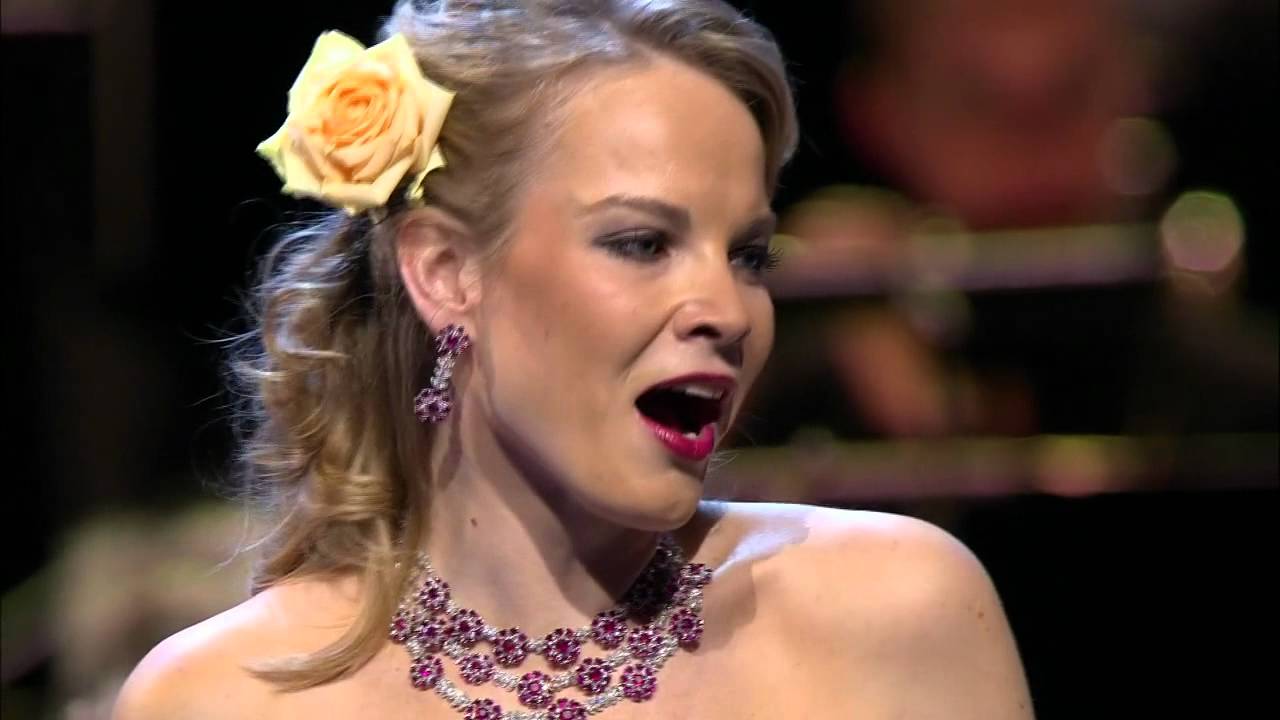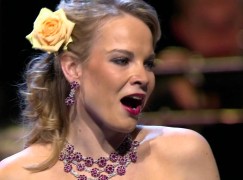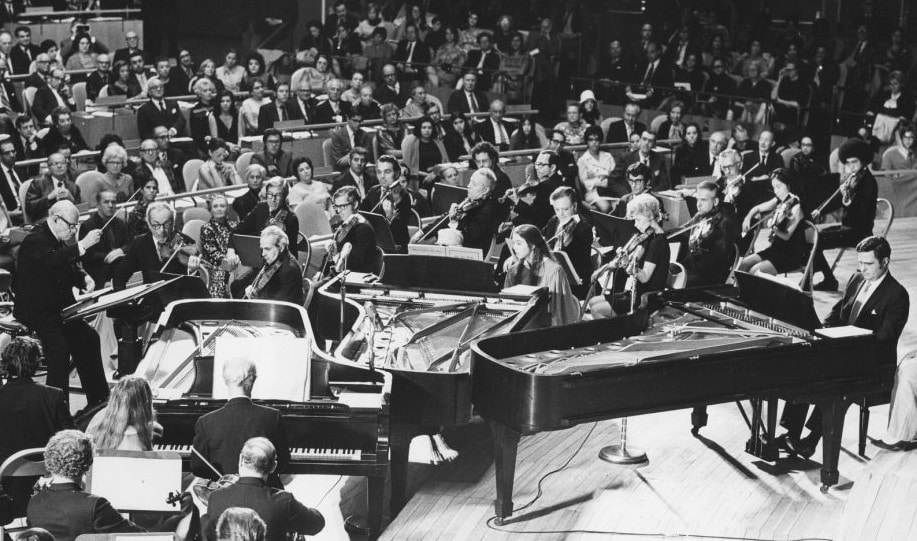There’s a difference between speaking English and singing it
mainI’m listening with mixed feelings to Daniel Barenboim’s new Elgar album on Decca.
It is beautifully and idiomatically played by the Staatskapelle Berlin and the Sea Pictures are sung by Elina Garanca in a much deeper, richer tone than we are used to from a long run of marvellous English mezzos. The colours of her voice are kaleidoscopic.
But the words are something else.
I am sure that Ms Garanca, who is married to the London-born conductor Karel Mark Chichon, speaks English with fluency and grace.
But back in Latvia she does not appear to have been taught to sing in English, which is a very specific discipline. English is not naturally a musical language. It needs nurture and expertise for its syllables and vowels to enhance a musical line.
This is Garanca in the new recording of Where Corals Lie.
And this is Dame Janet.
QED.







Dame Janet is unsurpassable here
The recording of Falstaff on the new CD is fantastic though, no?
I haven’t listened yet…. that orchestra is outstanding, for sure.
What a shame. Fine singing, but the language does not sound like English, nor is it phrased like English.
Surprising no-one said anything during the recording sessions. Maybe the crew was all local and not tuned to the problem.
Reminds me of the Monty Python Hungarian phrasebook sketch. Anyhow, quoting John Cleese: “I will not buy this record”. Not because it is scratched, but because it is not in English as we know it.
Interestingly, I’m listening to the new Kathryn Rudge recording with RLPO, it’s fabulous.
Mums steidzami nepieciešams Elgara darbu tulkojums latviešu valodā!
Priekš kam?
Tas pats jautājums attiecas uz operu angļu valodā.
What for?
But it’s interesting that Germans or Italians rarely complain about Anglo-Saxon singers making a mess of Puccini or Wagner.
Alas, pronunciation is not everything:
http://www.openculture.com/2019/03/leonard-bernstein-awkwardly-turns-the-screws-on-tenor-jose-carreras-while-recording-west-side-story-1984.html
The reason that “Germans or Italians rarely complain about Anglo-Saxon singers making a mess of Puccini or Wagner” is that in my experience they usually sing Italian and German rather well. It’s different of course with French! Try and find a German (or any other Wagner fan) who took any pleasure in listening to Domingo’s Siegmund a few days ago from LA. That’s not a criticism of Domingo: I just assume that Spanish-speakers find it hard to sing German. It’s not just the vowels – it’s as also the stress/extension of final consonants. I don’t know the technical term, but just hear the effects.
I take your point, but it’s a little unfair to compare it to one of the greatest recordings ever made of any work by a British composer.
Totally agreed, Ms. O’Norma.
But also: is music written in English so precious and delicate that it cannot be sung by speakers of a different language, with their own way of inflecting and accenting?
Have you heard *any* performances of operas written in Italian, French, German, or Russian, Norman? Those languages are constantly being “reinvented” by the singers of today, but nobody complains, nor should they.
I have heard lots of great performances where first class singers sing memorably in languages other than their own. Sometimes they are hard to understand. Sometimes their articulation sounds unattractive to me, but I put up because of otherwise exceptional performance. Boris Christof as Faust comes to mind.
Great singers who also sounded near native in other languages deserve a lot of respect: Nicolai Gedda is a great example.
It does not sound like english. It reminds me when i was in hospital i told the russian nurse i had piles she replied you are a rich boy.
I’m impressed that a Russian nurse’s command of idiomatic English extended to knowing that having “piles” (not piles of money) could mean the person was rich! Очень хорошо!
Yes, Falstaff superb, mixed feelings regarding Sea Pictures. Norman is spot on.
My review: http://www.colinscolumn.com/daniel-barenboim-records-elgar-sea-pictures-falstaff-elina-garanca-staatskapelle-berlin-decca/
Singing and language belong together. Most British singers cannot sing in German. A flagrant case is Emma Kirkby, whom I think has the loveliest female Baroque voice in her generation, when she sang Bach’s music; when I long ago found a newly released recording of the ‘Kaffee-Kantate’ and the ‘Bauern-Kantate’ with her in a shop (good times…) I bough it without hesitation, and the deception was as intense as the expectation; her German singing was ugly, almost incomprehensive.
In my experience English singers make the mistake of equating German with Italian. In the latter case vowels matter enormously, in the former consonants. I frequently have to bemoan the absence of proper endings to words when many (not all) English-speaking singers produce what they consider to be acceptable.
I think that Kirkby may have known (or at least sensed) that her German singing wasn’t the best; she certainly recorded rather less German music than Italian or English — and less Bach than one might have expected for such a star of the Baroque revival.
I think that recording of the Coffee and Peasant Cantatas is a particularly unfortunate example: performers who aren’t natural comedians doing comedic pieces that aren’t actually funny anyway. (Kirkby’s work in sacred Bach is better.)
If coffee weren’t still an international middle-class addiction (leading presenters to think, “Oh goody! A Famous Composer writing about coffee! Maybe punters will buy tickets!”), I think the Coffee Cantata might fade out of the active repertory almost completely, as the Peasant Cantata seems to have done.
Recorded on location in a hovercraft full of eels?
We’re always pickiest over our own language, for the obvious reason that we can most clearly hear the imperfections. There are admired “our own” UK singers (and Americans) who have been worse in German, Italian, French, or Russian than Elīna is in English.
Questionable assertion on at least two counts.
First, this is for once not a case of English parochialism. The same can and does happen in many cultures with a rich vocal tradition.
Second, there have long been, and fortunately still are, vocal artists well versed in the intricacies of interpreting music and text in other languages than their native tongue, with enviable mastery of diction, prosody, and rhetoric.
A few random examples? Felicity Lott is fêted in France for her perfect and graceful rendition of French chansons. Anne Sofie von Otter has never, to my knowledge, been faulted for her diction and ‘Klangrede’ (to use Harnoncourt’s term) in Italian, French, or German. No one impugned the pronunciation and diction of Lucia Popp, Edita Gruberova, Teresa Berganza or, a current example, Nuria Rial.
Farther back, neither Viorica Ursuleac — favourite dramatic soprano of Richard Strauss and for many the quintessential Strauss performer — nor Hariclea Darcléé, who created Puccini’s Tosca and Catalani’s La Wally, were notably hampered by performing in foreign idioms for the length of their outstanding careers.
Naming some singers who were good in languages not their own doesn’t undercut an assertion that people care more about (and actually can recognize) flawed pronunciation when the language being sung is their own.
Nevertheless, when pandemic conditions pass and Covent Garden gets the ball rolling again, I’ll look forward to entries similar to this one about incomprehensible German in Wagner and Beethoven, clumsy Italian in Verdi and Puccini, approximate French in Bizet and Offenbach, and phonetic Russian in Tchaikovsky and Mussorgsky, from the home-grown talent.
N.B. This doesn’t mean such performances are without other artistic merits. I never heard the Canadian Jon Vickers sound idiomatic in any language other than English, but he was a great interpreter.
The opening rhyme of “Where Corals Lie” always struck me as a bit desperate. Since when could air sensibly be described as “spry”?
Glad I’ve got that off my chest 🙂
While her consonants aren’t so crisp, in her defense, she does roll her ‘r’s in that way that British singers do much more than I (an American) hear in American singers.
Even if it is not entirely idiomatic it is enriching to hear this music sung by a Mezzo who is not a native English speaker and one as gifted as Elina Garanca.
The difficulties in listening to this for me are one or two vowel sounds ( almost a French ‘e’ muet on ‘the?’) which are not accurate and the phrasing of the poem ( as viewed by Elgar.) Some of the phrasing issue could be to do with the final editing of the disc?
We shouldn’t fool ourselves either that when English speaking singers record music in other languages they always achieve a result which would pass as a native speaker level despite their efforts.
In general there is clarity in Garanca’s diction and a sincere approach to the work. There have been recordings by British singers of Sea Pictures where the diction has not always been clear.
I remember a wonderful English speaking singer being taken to task by a critic who said that instead of singing
‘ one gleam like a bloodshot sword-blade swims on the sky line’ in ‘The Swimmer ‘
it sounded as if she was singing about ‘ a bloodshot cornflake.’ The prosody in these songs can be tricky.
Dame Janet with Barbirolli is of course a reference and I think I liked her later concert versions with Vernon Handley even more. Sadly no Kathleen Ferrier , Norma Procter or Helen Watts recordings of the cycle .
It is pleasing to listen to the now somewhat forgotten Gladys Ripley who recorded the work 4 times . Hers is a lighter contralto timbre , the recordings sometimes sound their age , but she is as enchanting as a mermaid should be.
Nice to see a reference to Ms. Ripley, whose voice I first heard singing in the movie, The Great Mr. Handel. Beautiful voice. Also love her you tube rendition of Hadyn’s Spirit Song. Wish she had more music on you tube.
I have heard a lovely performance of the Sea Pictures by Angelika Kirdchschlager and quite a few Italian operas by English-speaking singers whose words were really unintelligible.
Angelika Kirchschlager has excellent sung diction. I’ve even got a recording of her singing in Welsh, which she does admirably.
For an international opera-oratorio singer, based on the repertoire played internationally the languages he or she should learn to sing in order of importance are:
-Italian
-French
-German
-Russian
Next would be Czech or English. So quite understandable that she didn’t have a English singing course in her curriculum despite how important britons think it is.
Silly sneering comment about “britons”. Nothing wrong with drawing attention to the shortcomings of the recording and making comparisons. She wasn’t forced to make it.
NL says quite reasonably that “English is not naturally a musical language”.
Does French really come before German?
Only Italians should sing Italian opera, Germans should sing German opera and only English singers should perform English music. I’m serious, otherwise it’s like hearing Shakespeare performed with a foreign accent. It can work but doesn’t get to the essence. I feel the same way about symphonic music, Germans for Beethoven, Austrians for Schubert and Jews for Mahler. Fire away.
And comments section should only be for those who have something reasonable and interesting to say. No, I am not “serious“ at all.
Today’s Met Opera webcast is The Magic Flute sung in English. Sure, you can tell the native speakers from the non native speakers, but with Mozart’s melodies, you don’t mind. What’s interesting is the audience reaction, they are laughing at all the right places, and not ahead of the singers by reading the subtitles before the singers sing the sentence.
The point is, hearing a piece, as singing a piece, in one’s own language makes a big difference in the experience of that piece.
No doubt, Elina Garanca’s Italian to an Italian’s ear is not the same as to a Brit’s ears: few singers, as few audience members, can claim true natively fluency in more than one or two languages.
Gimme a break. I have listened to scores of singers, trying their best *not* to murder the German language. Some were excellent, some less so, some almost laughable (e.g. Domingo in his early attempts). And I’m talking both opera houses and CDs. Not everybody is fluent in every language, not even every singer. So, Janet Baker’s English is better than Elina Garanca’s? Get over it and try to listen to the interpretation.
Some singers with clearly intelligible English: the Dane Aksel Schiotz in Messiah, British tenor Heddle Nash in the same with added yelps, Gerald Finley, Roderick Williams, Maggie Teyte, Margaret Ritchie, often Elisabeth Schwarzkopf, some Broadway singers.
Dame Maggie used to terrorized students, sitting out front at their rehearsals, sweetly enquiring, “Whhaaattt langwidge arrrre you singgginggg innnn?”
There are far too many singers from whom I get not a single word. Many of them are eastern European, few are Italian or German. Some seem to have been taught to produce a seamless stream of unvaried sound undifferentiated by a consonant or vowel, just generalized ululation.
Composers worked so hard with their poets to set syllables vocally. A pity. Very few indeed are the voices that command attention as lyrical sounds alone, wordless. Who was it who just wrote here he liked songs without words better than words without song?
Lotte Lehmann, Salvatore Baccaloni, HansHotter, Gigli had no problem getting the words out, or Albanesi and Olivera at their best, not to invoke Muzio again. Melchior, Helen Traubel, they all seem so long ago. Fischer-Dieskau and Schwarzkopf’s German, whatever their other qualities.
May I assume you are referring to (Licia) Albanese and (Magda) Olivero?
Many want to have it both ways, and not only the British. But to take the present example, many moan that Elgar isn’t more performed and appreciated abroad… and when performed by non-natives, they complain that it’s not idiomatically done.
For me, now that I’m becoming deaf , it is diction rather than pronunciation which is the problem . So many singers have indistinct diction , so that whatever language they sing in, it becomes difficult to know what the words are . To my imperfect ears, this is the problem here : it is a rather rich and beautiful voice, but the words are swallowed
In my experience, the finest-sounding singer in English with whom I had the pleasure of working is Dawn Upshaw, especially in 1990s when she was at the peak of her prime.
Overall however, I have never encountered better singing diction than that of Bryn Terfel, in all those three languages (English, Italian, German) in which I heard him.
How wonderful to hear someone singing Elgar who is not a native English speaker, but who has a fabulous voice which she uses well. May we hear many more.
I have a recording of Dame Clara Butt singing this. Very impressive.
I totally agree: there is nothing more horrific in the world than hearing an Englishman or an American singing in Spanish. It’s like a bad joke.
Thanks for making me aware of this beautiful recording. I look forward to adding it to my collection. Garanca’s diction is not as clear as Dame Janet’s; but is anybody’s? And frankly the words are so strange sometimes that I would need to be reading along to believe what they are.
Thanks, too, for the reminder of what a marvel Dame Janet was. An unsurpassable recording.
She’s also awful in carmen (french) , cavalleria (italian) , rosenkavalier (german).Her mumbo-jumbo phrasing is little compensated by her gracious and beautiful natural voice.
Sorry , but these are unacceptable with the top ensembles and venues that were granted to her.
That’s the way it was from the beginning of her career , also on endless recordings – and then record companies are marveling at their meager sales.
I guess it doesn’t bother me as much as it bothers some.
Then again, one of my first loves was Joan Sutherland, so… 🙂
Oh dear, I didn’t hear anything amiss at all here, just a lovely voice and winning phrasing, with words no more inaudible than with many native English-speakers.
As an Italian I’ve always had the politeness of not pointing out the deficiencies in pronunciation of many non-Italian singers, especially English speakers. But obviously British people, in particular this blog and its readers, will always find a reason to express their xenophobia, racism, exceptionalism and pettiness.
‘As an Italian I’ve always had the politeness of not pointing out the deficiencies in pronunciation of many non-Italian singers’
Well that makes you very unusual indeed. This is simply a record review, nothing more, and your prickly response could, itself, be regarded as a sign of racism etc, if one must.
What is going on here? Since when has any performance of any work in the classical repertoire been entitled to immunity from comparison or criticism?
Now we have accusations of racism? Some people here need to step off the racism bandwagon and calm down a little.
I re-listened to Dame Janet singing some Brahms lieder.
Just superb, but her German diction is clearly not as perfect as a native German speaker. It works both ways you know.
Sigh……ah, Dame Janet…..none like her, ever.
It’s not that bad, though I don’t understand why she cannot sing “when winds” instead of “ven vinds”. Someone tell me, would it be that hard for her?
I had a recording of Fischer-Diskau singing Ives songs that was a great party record the English was so bad. “Shall ve gatter at der Rrrriver” and so on.
I’m surprised that Barenboim hadn’t a better ear for the language and apparently no neat the DECCA (they are still an English company no?) did either! As for Dame Baker, BRAVA!
Standards for spoken English could include Patrick Stewart, Laurence Olivier, John Barrymore and Dylan Thomas on the theatrical side, Judith Anderson, Angela Lansbury (who was in the original “Picture of Dorian Gray” with Hurd Hatfield (so good it ruined his career) and George Sanders; Henry Reed, and the like, including thee impressive former Danish prime minister Rasmussen, when secretary general of NATO.
The thought of non-Russians singing Russian is lessened only by memoriesof Alexander Kipnis though with Ukrainian-Jewish accent I’m told;, Ivan Kozlovsky, and Nicolai Gedda, who was half Russian. Chaliapin and Vkadimir Rosing weren’t bad. Nina Koshets and Maria Kurenko are, ah, unforgettable, the former sang with Rachmaninoff and is dedicatee of his songs, the latter recorded with Gretchaninoff. Lamented Dmitri Hvorostovsky’s Sviridov songs with pianist Arkadiev are transfixing, one of the great recordings.
For spoken German, Will Quadflieg, Gustav Gruendgens, Theodor Heuss, uva.
Claudia Muzio’s Italian parlando mesmerizes me. Gabriele d’Annunzio, poet, playright, and commandante of Trieste-Fiume is said to have had the most beautiful classic Italian,voice in recitation., drawing throngs reading at ristorantes. I’d be disappointed if the poets Giacomo Leopardi and Giosue Carducci did not also.
.
The poets are notoriously bad readers, , excepting Dylan Thomas, Reed, Auden, perhaps Eliot and Frost. Flat monotonic robinson Jeffers, John Crowe Ransome, Ginsberg, Marianne Moore beg the question.
I disagree completely. Many singers, many popular singers, particularly Barbara Cook, can show you the beauty of singing in English, especially American English, which has a number of vowel colors, such as ah, aw, aa, aaaa, etc.
A good word for Simon Winchester, John LeCarre, and John Lee as cultivated English speakers of Audio-Books, the first two of their own books.
Christopher Storey — Your hearing loss hasn’t lessened your love of music or writing ability. I’ve lost upper frequencies, throwing sometreble passages out of tune on piano not blamable on tuners.. Richter had a similar problem. Furtwaengler’s hearing loss led him to wire his podium railing for sound, and not to fight pneumonia that brought him to a Baden clinic where he died at 68.
Well-engineered Danish hearing devices made by Otonics help and capture hair-dryers, leaf-blowers, and vacuum cleaners marvelously. There are compensations.
Sam Barber’s singing of his “Dover Beach” with the Curtis quartet is an example of clear, simple Emg;ish diction.
It reminds me of the Australian lady who went into the bookshop and asked for the section dealing with naughty books. The salesman directed her to the pornographic
Section of books. she then Exclaims that is not what i want it is for the grandchild
Noddy books.
The difference has more to do with vocal production than articulation or pronunciation. Dame Janet’s placement is bright, forward and uncovered. Garanca’s voice is more covered, giving her a round, chocolatey sound; but that’s not always great for text being understood. (ref: Sutherland) I love them both.